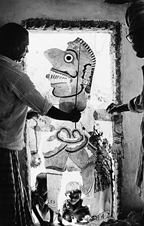Nee Engey—Where Are You
Nee Engey INDIA / 2003 / Hindi, Tamil, Marathi, various languages of India / Color / Video / 153 min
INDIA / 2003 / Hindi, Tamil, Marathi, various languages of India / Color / Video / 153 min
Director, Script, Photography, Producer: R.V. Ramani
Editing: R.V. Ramani, Vijai Sankar
Production Company, Source, World Sales: Cinegraph
16, (New No. 10), 5th St. Bhaktavatsalam NagarAdyar Chennai 600020 INDIA
Phone: 91-44-244-20359
Fax: 91-44-249-10913
E-mail: ramanirv@hotmail.com
In search of people who once staged shadow plays across South India, we find that the craft survives and the songs live on. However, now performers dance to film soundtracks, the main business shifts to selling accessories and modern skits are added to the Ramayana shadow puppets. But still the thrill when the light comes on behind the white cloth remains unchanged. While there are many amusing anecdotes, such as the time puppeteers were so hungry they ate the leather dolls, the real joy is the encounter between the director’s own free-spirited camerawork and the shadow players.
 [Director’s Statement] I consider shadow puppeteers to be the original filmmakers who created moving images on the screen. Before the advent of cinema and television, shadow puppet theater was prevalent and extremely popular for many centuries in India. Puppeteers led a nomadic life, traveling, camping, setting up screens, and performing the story of Ramayana, adapting local languages and flavors. Today there are only a few puppeteers still practicing this art form. Stories and lifestyles have changed.
[Director’s Statement] I consider shadow puppeteers to be the original filmmakers who created moving images on the screen. Before the advent of cinema and television, shadow puppet theater was prevalent and extremely popular for many centuries in India. Puppeteers led a nomadic life, traveling, camping, setting up screens, and performing the story of Ramayana, adapting local languages and flavors. Today there are only a few puppeteers still practicing this art form. Stories and lifestyles have changed.
As a practicing documentary filmmaker, I feel one with the predicament of the puppeteers. Independent cinematic expression is getting increasingly difficult, as the medium is getting caught in the whirlpool of commercialization. The rural society of India, which at one point sustained the traditional shadow puppeteers and their performances, is now at a crossroads with changing values. Opportunities for the puppeteers to perform are diminishing. Today we find many of the traditional shadow puppet theater families shifting into other vocations.
In my search for the puppeteers, I experienced a complete sense of belonging with this community. This film with the shadow puppeteers living in South India is a journey in search of a missing link that is common to all communities, cultures, traditions and artistic expressions. The film is a celebration and dedication to the art of moving images, its original practitioners and community, and an impressionistic ethnography reflecting on shadow puppet theater, history, mythology, cinema and our lives.
 R.V. Ramani
R.V. RamaniBorn in 1957. Graduated in 1985 from the Film and Television Institute of India, Pune, specializing in motion picture photography. Started making independent documentaries and short films from 1990. With more than fifteen independent films to his credit, has established a unique style acclaimed in India and abroad. Considers all works to be explorations into various facets of expression. Strictly works on the plane of documentary, but films offer an experience of fiction. Works have been shown in numerous international film festivals. Retrospectives presented at the Mumbai International Film Festival 2002, the Third Asia-Pacific Triennial of Contemporary Art, and DokumentART. Has worked on many films as cinematographer. Serves as faculty member with many institutions and regularly conducts documentary film workshops. |
|
• New Asian Currents | Sand and Water | Wellspring | Three-Five People | Homesick | The Circle’s Corner | The Maze of Lanes | Nee Engey—Where Are You | NEW (IMPROVED) DELHI—Director’s Cut | A Night of Prophecy | 150 Seconds Ago | The Ballad of Life | Noah’s Ark | The Old Man of Hara | Dandelion | Hibakusha—At the End of the World | 3rd Vol.2—2 Light House | And Thereafter | Dust Buries Sabuk | Family Project: House of a Father | Edit | Gina Kim’s Video Diary | Ordo | Her and Him Van Leo | The Big Durian | Perpetual Motion | Debris | Hard Good Life | Nail | The Rhythm in Wulu Village | A Short Journey • Jurors | Kim Dong-won | Kawase Naomi • New Asian Currents Special | Part 1 | Part 2 |
